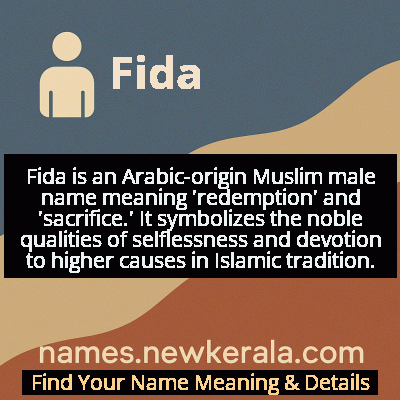Fida Name Meaning & Details
Origin, Popularity, Numerology Analysis & Name Meaning of Fida
Discover the origin, meaning, and cultural significance of the name FIDA. Delve into its historical roots and explore the lasting impact it has had on communities and traditions.
Name
Fida
Gender
Male
Origin
Muslim
Lucky Number
2
Meaning of the Name - Fida
Fida is an Arabic-origin Muslim male name meaning 'redemption' and 'sacrifice.' It symbolizes the noble qualities of selflessness and devotion to higher causes in Islamic tradition.
Fida - Complete Numerology Analysis
Your Numerology Number
Based on Pythagorean Numerology System
Ruling Planet
Moon
Positive Nature
Diplomatic, friendly, artistic, empathetic.
Negative Traits
Over-sensitive, moody, indecisive, prone to self-pity.
Lucky Colours
Green, cream, white.
Lucky Days
Monday.
Lucky Stones
Pearl, moonstone.
Harmony Numbers
1, 3, 4.
Best Suited Professions
Diplomats, mediators, caregivers, artists.
What People Like About You
Cooperative spirit, friendliness, artistic talent.
Famous People Named Fida
Fida Mohammad Khan
Politician
Former Chief Minister of Khyber Pakhtunkhwa, Pakistan
Fida Hussain
Civil Servant
Senior Pakistani bureaucrat who served in various high-ranking government positions
Fida Muhammad
Religious Scholar
Islamic scholar and educator who contributed to religious education in South Asia
Fida Ali
Businessman
Prominent entrepreneur in the Middle East with significant business ventures
Name Variations & International Equivalents
Click on blue names to explore their detailed meanings. Gray names with will be available soon.
Cultural & Historical Significance
The name carries echoes of historical and religious narratives where sacrifice for truth and justice is celebrated as the highest form of spiritual achievement. Throughout Islamic history, the concept of fidā' has been central to understanding martyrdom and religious devotion, making this name particularly meaningful in families with strong religious values or historical connections to struggles for faith and freedom. The cultural resonance of Fida extends beyond religious contexts to encompass broader themes of patriotism, family honor, and social responsibility that are deeply valued in many Muslim societies.
Extended Personality Analysis
Individuals named Fida are often perceived as deeply principled, selfless, and committed to causes larger than themselves. They typically exhibit strong moral convictions and a natural inclination toward helping others, often putting community needs before personal desires. Their personality is characterized by resilience and determination, with an ability to endure hardships for the sake of their beliefs or loved ones. Fidas are usually reliable and trustworthy, earning respect through their consistent demonstration of integrity and willingness to make personal sacrifices for the greater good.
They tend to be thoughtful leaders rather than impulsive decision-makers, carefully considering the consequences of their actions on others. While they may appear serious or intense at first, those who know them well appreciate their deep capacity for loyalty and their quiet, steadfast support during difficult times. Their strength lies in their ability to remain committed to their principles even when faced with significant challenges or opposition. This combination of moral fortitude and practical compassion makes Fidas natural pillars in their families and communities, often serving as mediators, advisors, or quiet influencers who work behind the scenes to maintain harmony and justice.
Modern Usage & Popularity
In contemporary times, Fida remains a meaningful though moderately used name in Muslim communities worldwide, particularly in Pakistan, India, Bangladesh, and Arab countries. While not among the most popular names, it maintains steady usage among families valuing traditional Islamic names with deep spiritual significance. The name has seen some resurgence in recent years as younger generations rediscover names with strong ethical and religious connotations. In diaspora communities, Fida serves as a cultural anchor, connecting children to Islamic values of sacrifice and redemption while being relatively easy to pronounce in Western contexts. Digital globalization has also helped maintain the name's relevance, with social media allowing Fidas from different regions to form informal networks and share their experiences of carrying this meaningful name. The name's usage patterns show it is often chosen by educated, religiously conscious families who wish to instill values of service and commitment in their children.
Symbolic & Spiritual Meanings
Symbolically, Fida represents the ultimate expression of selflessness and spiritual commitment - the willingness to sacrifice personal comfort, security, or even life itself for higher principles, faith, or community welfare. It embodies the concept of redemption through sacrifice, suggesting that true fulfillment comes from giving rather than receiving. The name carries connotations of purification through self-denial, transformation through devotion, and the idea that personal identity finds its deepest meaning in service to others. In metaphorical terms, Fida symbolizes the bridge between earthly existence and spiritual ideals, representing the human capacity to transcend selfish interests for noble causes. It speaks to the Islamic concept that the most valuable things in life often require the greatest sacrifices, and that true strength lies in the ability to give oneself completely to what one believes in. The name thus serves as a constant reminder that personal significance is achieved through meaningful contribution rather than accumulation.

